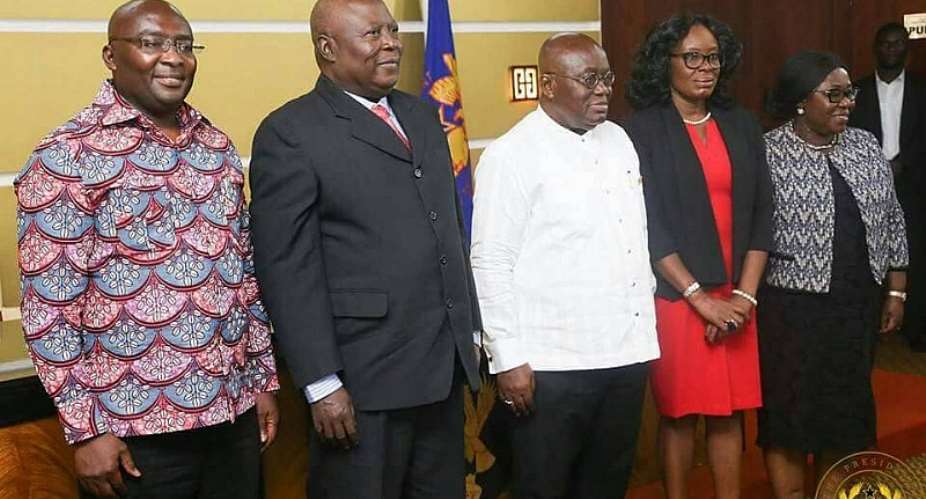The Western Regional Correspondent of ModernGhana online portal, Mr. Daniel Kaku has indicated that the Office of the Special Prosecutor will be meaningless until the Right to Information (RTI) Bill is passed into law for free flow of information.
His comment follows the appointment of Mr. Martin Amidu, a former Attorney-General, a staunch anti-graft campaigner and a member of the National Democratic Congress(NDC) as the first Special Prosecutor by the President, His Excellency Nana Addo Dankwa Akufo-Addo.
He considers himself as a member of the cadres, the core members who believe in the ideals of probity, integrity and accountability championed by former president Rawlings.
Mr. Kaku noted that as a cadre who shares the ideals of probity, integrity, transparency and accountability, championed by former President Jerry John Rawlings, Mr.Amidu has the expertise to help curb corruption in the country.
"By this decision, President Akufo-Addo has demonstrated his readiness and commitment to fight against corruption in the country and I wish to use this platform as a citizen to extend my warmest felicitations to Mr.Amidu", he applauded.
The Reporter was of the view that "although the establishment of the Office of Special Prosecutor is in the right direction, until the government and parliament pass the RTI Bill into law, the Special Prosecutor can't function well".
According to him, the passage of the Right to Information (RTI) Bill will give citizens of Ghana the basis to demand accountability and transparency from duty-bearers hence will enhance the work of the Special Prosecutor more effectively as anticipated.
"I want to tell the government that access to information is an indispensable requirement for a successful fight against corruption and if the government wants Mr. Martin Amidu to succeed then the RTI Bill must be passed into law", he emphasized.
He also added, "we the journalists find it very difficult to demand any credible information from government officials, public servants among others all because we don't have powers to do so but we also think that with the passage of the RTI Bill, it will help us to expose the corrupt dealers in the country".
He added that the passage of RTI Bill which would facilitate the provision of the necessary ammunition for the Office of Special Prosecutor has not been laid before Parliament by this government and worried about where the Special Prosecutor was going to get credible information from.
The right to information is a fundamental human right guaranteed by the country’s 1992 Constitution, and recognized as a right under International Conventions on Human rights.
The Bill as it has been drafted, is to lend much credence to Article 21 (1) (f) of the Constitution which states that “All persons shall have the right to information subject to such qualifications and laws as are necessary in a democratic society”.
The Right to Information Bill was first drafted in 1999 under the former President, Jerry John Rawlings. Various advocacy groups emerged to press for the immediate passing of the bill into law in 2002. The draft bill was reviewed in 2003, 2005 and 2007.
The National Democratic Congress (NDC) in its 2008 and 2012 election manifestos promised to ensure the Bill is passed. In 2010, the Bill was presented to Parliament for consideration.
In 2011, the government signed unto the Open Government Partnership (OGP) Initiative with a commitment to pass the Bill. In November 2013, the Bill was formally laid before parliament.
Former Deputy Attorney General, Dominic Ayine in 2015, moved the Bill for second reading in Parliament. In October 2016, the Bill was withdrawn and replaced with a new one which was immediately laid.
Following the dissolution of the Sixth Parliament of the Fourth Republic and the swearing-in of a new Parliament in January 2017, the Bill is no longer in Parliament.
It must be reintroduced to the House by the new government before work commences on it again.
Source: Paul Yankey






 Lay KPMG audit report on SML-GRA contract before Parliament – Isaac Adongo tells...
Lay KPMG audit report on SML-GRA contract before Parliament – Isaac Adongo tells...
 Supervisor remanded for stabbing businessman with broken bottle and screwdriver
Supervisor remanded for stabbing businessman with broken bottle and screwdriver
 NDC watching EC and NPP closely on Returning Officer recruitment — Omane Boamah
NDC watching EC and NPP closely on Returning Officer recruitment — Omane Boamah
 Your decision to contest for president again is pathetic – Annoh-Dompreh blasts ...
Your decision to contest for president again is pathetic – Annoh-Dompreh blasts ...
 Election 2024: Security agencies ready to keep peace and secure the country — IG...
Election 2024: Security agencies ready to keep peace and secure the country — IG...
 People no longer place value in public basic schools; new uniforms, painting wil...
People no longer place value in public basic schools; new uniforms, painting wil...
 'Comedian' Paul Adom Otchere needs help – Sulemana Braimah
'Comedian' Paul Adom Otchere needs help – Sulemana Braimah
 Ejisu by-election: Only 33% of voters can be swayed by inducement — Global InfoA...
Ejisu by-election: Only 33% of voters can be swayed by inducement — Global InfoA...
 Minority will expose the beneficial owners of SML, recover funds paid to company...
Minority will expose the beneficial owners of SML, recover funds paid to company...
 Prof. Opoku-Agyemang has ‘decapitated’ the NPP’s strategies; don’t take them ser...
Prof. Opoku-Agyemang has ‘decapitated’ the NPP’s strategies; don’t take them ser...
